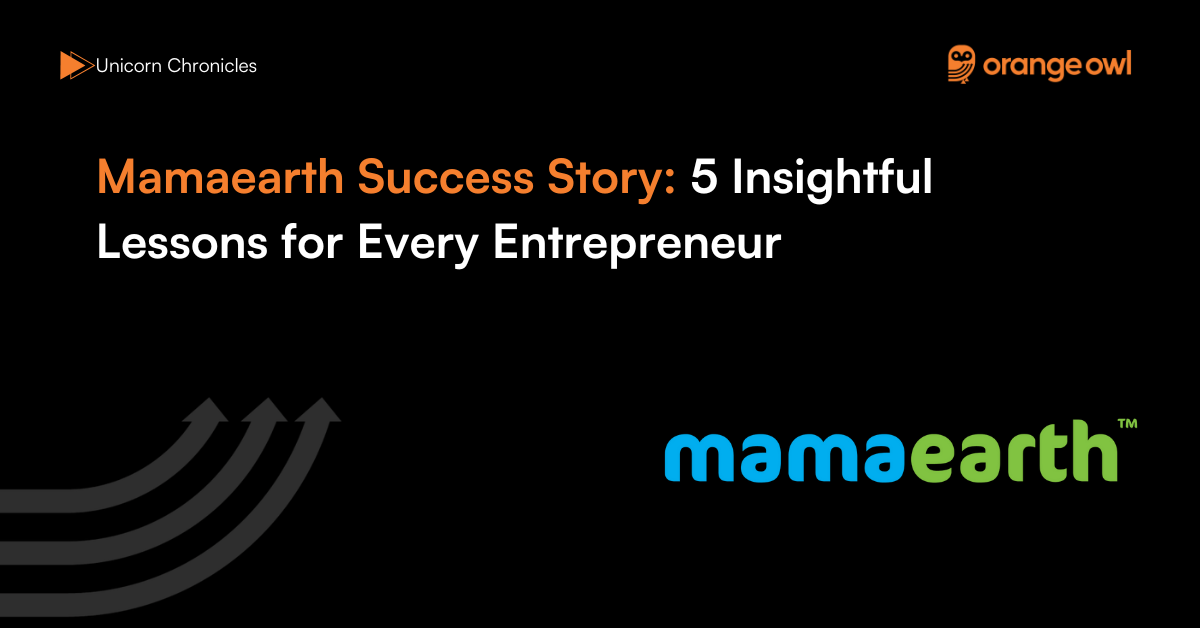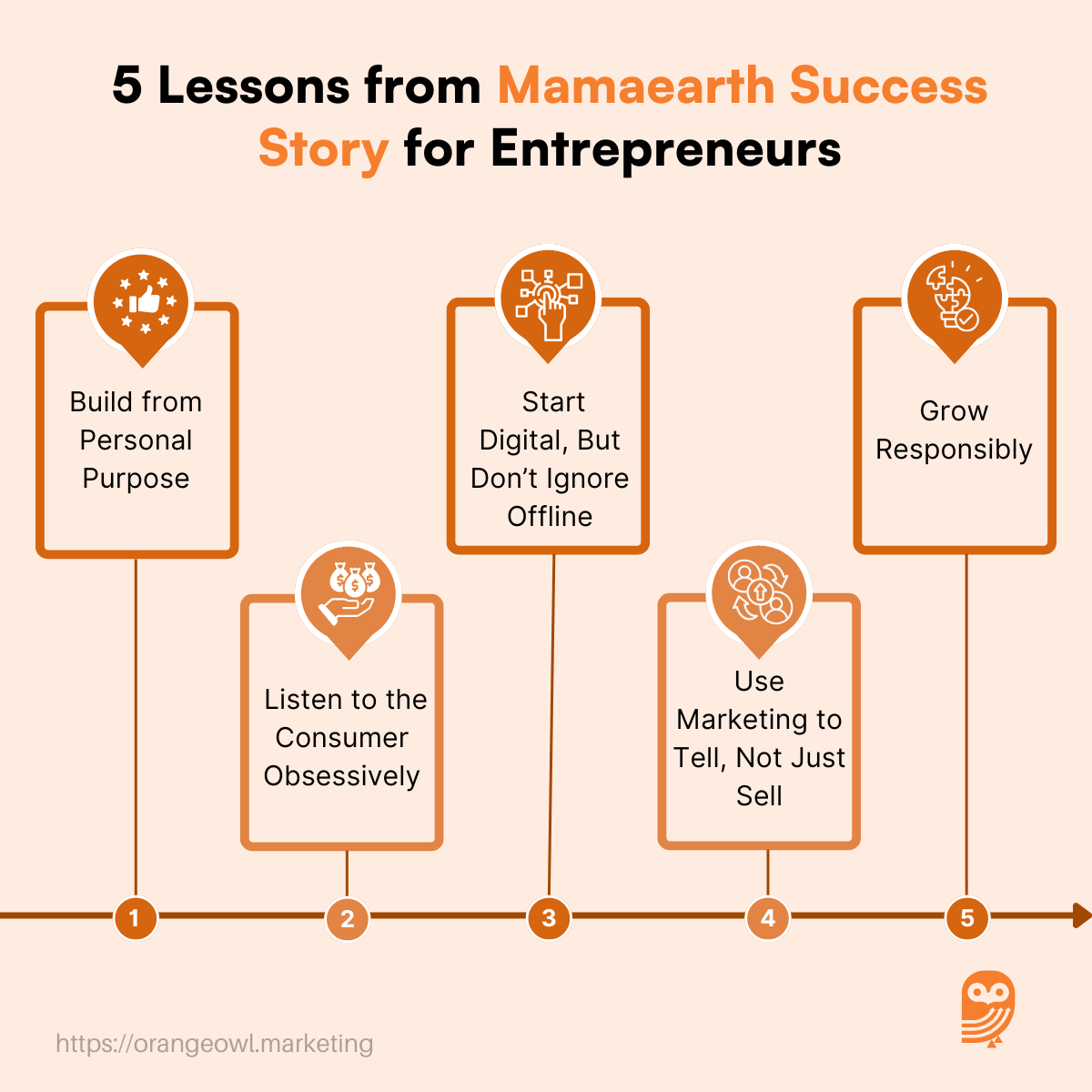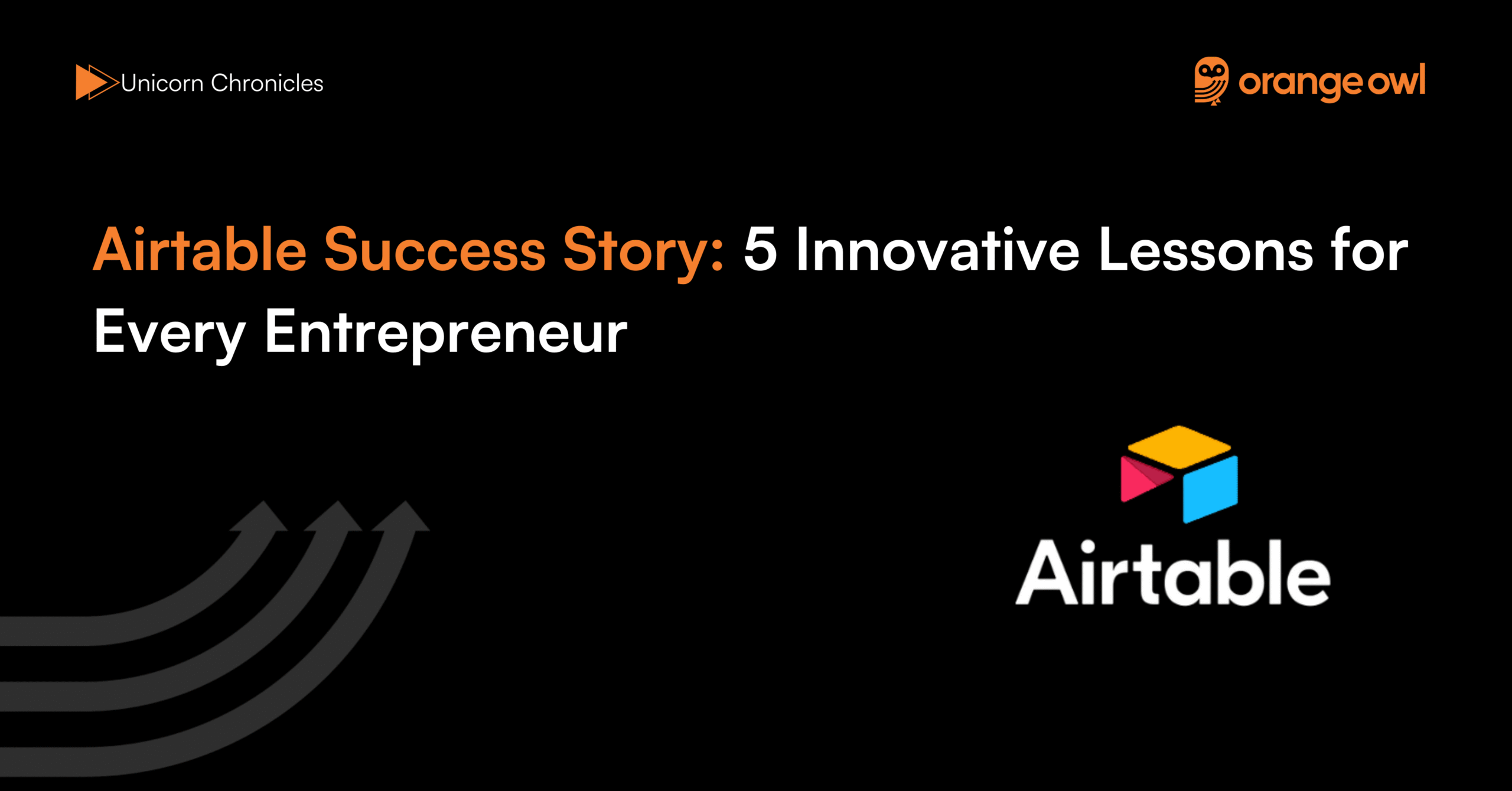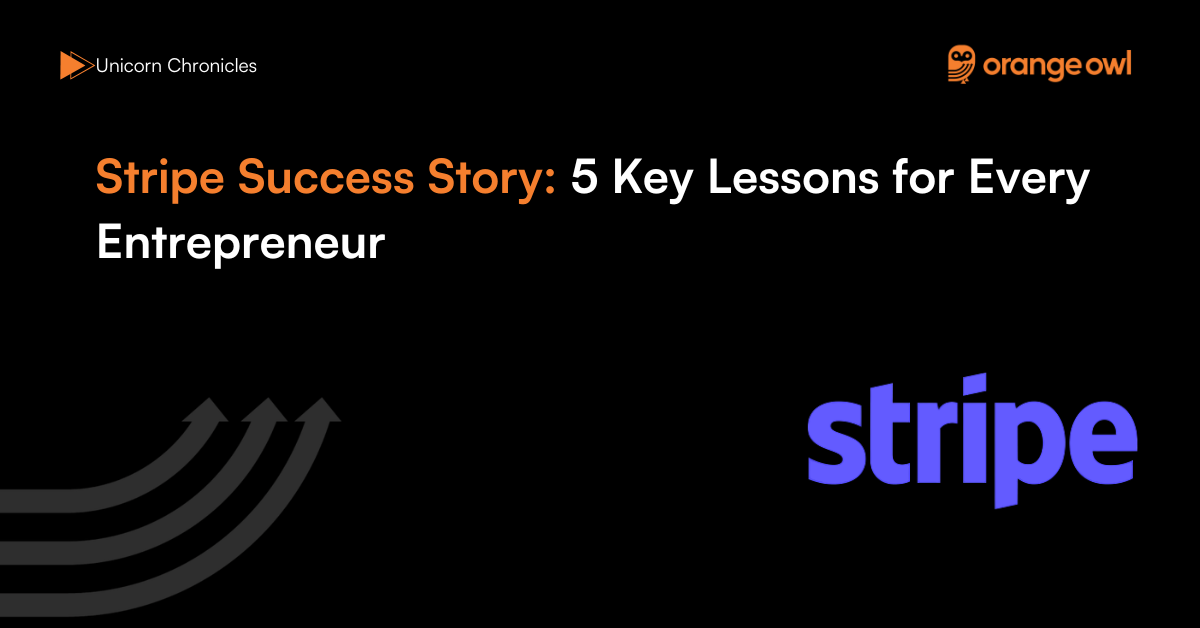Mamaearth Success Story: 5 Insightful Lessons for Every Entrepreneur
Vivek Goel
June 17, 2025

Table of Contents
Introduction
In the ever-evolving Indian startup ecosystem, Mamaearth has emerged as a formidable disruptor in the personal care segment. At a time when the market was saturated with legacy brands and chemical-laden products, Mamaearth carved a niche for itself by championing toxin-free, natural, and eco-conscious beauty and wellness solutions. Founded by Ghazal and Varun Alagh in 2016, Mamaearth wasn’t just another startup—it was a movement led by purpose, care, and a deep understanding of consumer concerns.
The couple’s entrepreneurial journey, rooted in their personal experiences and a commitment to positive change, is not only inspiring but also loaded with practical lessons for aspiring business leaders. From ideation and execution to scaling a purpose-driven brand, Mamaearth’s story is a modern-day blueprint for meaningful entrepreneurship.
In terms of market positioning, Mamaearth has achieved significant milestones. According to Euromonitor International, Mamaearth ranks as the third-largest skincare brand in India as of 2023. This ascent underscores the brand’s growing influence in the Indian beauty and personal care industry.
Financially, Mamaearth’s parent company, Honasa Consumer Ltd., has demonstrated robust growth. In the fourth quarter of the fiscal year 2025, Honasa reported a 13% year-on-year increase in revenue from operations, totaling ₹534 crore, up from ₹471 crore in the same quarter of the previous fiscal year. Over a five-year span, Mamaearth’s revenue has grown from ₹1,142 million in FY20 to ₹19,696 million in FY24, reflecting a compound annual growth rate (CAGR) of 103.8%.
These achievements highlight Mamaearth’s successful navigation through a competitive landscape, leveraging consumer trust and a commitment to quality to establish itself as a leading brand in India’s personal care sector.
Origin Story
Mamaearth was born out of necessity, not just ambition. When Ghazal and Varun Alagh were expecting their first child, like many young Indian parents, they sought the best and safest products for their baby. But what they discovered was deeply concerning—most baby care products available in India were either loaded with harmful chemicals or lacked transparent labeling. Even the safer alternatives were imported, expensive, and inaccessible to the average Indian consumer. This glaring gap in the market, especially in the baby and maternal care segment, became the couple’s call to action.
Ghazal, with her creative instincts and passion for beauty and wellness, began researching ingredients, formulations, and safety standards. She drew on her personal values and maternal instincts, determined to create a product she could trust for her own child. Meanwhile, Varun brought years of experience from the FMCG sector, having worked with companies like Hindustan Unilever and Coca-Cola. His expertise in brand management, consumer behavior, and operations complemented Ghazal’s product-led vision perfectly.
Together, they launched Honasa Consumer Pvt. Ltd., the parent company behind Mamaearth, in 2016. Their mission was clear: to offer toxin-free, safe, and natural personal care solutions rooted in honesty and environmental responsibility. From the start, Mamaearth differentiated itself with its commitment to ingredient transparency, eco-friendly packaging, and cruelty-free certification.
As Ghazal shared in an interview, “I wanted to create something I could trust for my own baby. If I couldn’t find it in the market, I had to build it.” This wasn’t just a business opportunity—it was a purpose-driven initiative. This deeply personal motivation gave Mamaearth a brand narrative that resonated powerfully with millions of Indian consumers, especially young parents, millennial women, and health-conscious individuals.
The founders’ authenticity, combined with their clear mission, helped Mamaearth gain early trust and loyalty. It wasn’t just about selling skincare or wellness products—it was about building a community that believed in conscious consumption.
Business Landscape and Early Challenges
When Mamaearth entered the Indian personal care market, it was up against titans—legacy brands like Hindustan Unilever, Procter & Gamble, Dabur, and Johnson & Johnson had dominated the space for decades. These conglomerates had deep pockets, massive distribution networks, and entrenched consumer trust. For a new player like Mamaearth, standing out required more than just marketing—it demanded a complete rethink of how personal care brands engaged with consumers.
One of the primary hurdles was consumer perception. Natural and organic products, though increasingly trendy, were often viewed with skepticism. Many buyers equated “natural” with being less effective or slow to show results. Mamaearth had to not only educate its audience about the benefits of toxin-free ingredients but also demonstrate that these products could match—if not surpass—the efficacy of conventional alternatives.
Another major challenge lay in sourcing and production. Ensuring the supply of high-quality, certified-safe ingredients was no easy task, especially while adhering to international standards like Made Safe certification. The team also had to navigate India’s complex regulatory environment for cosmetics and wellness products, balancing compliance with innovation.
Logistics and supply chain posed additional complexities. Being a startup with limited resources, Mamaearth had to build its distribution network from the ground up. Ensuring product freshness, maintaining temperature-sensitive ingredients, and reducing delivery lead times were constant operational challenges. Simultaneously, they needed to invest in product development, content-driven marketing, customer support, and technology—often on a shoestring budget.
Brand awareness was another uphill battle. In a market where trust is paramount, especially for products meant for babies and skin, gaining the consumer’s confidence took time and consistency. The team relied heavily on social media storytelling, influencer partnerships, and direct-to-consumer engagement to build credibility.
But what truly set Mamaearth apart was its unwavering focus on consumer needs. As Varun Alagh noted in an interview, “You have to obsess about your consumer. Every big decision we made—product lines, packaging, marketing—was guided by what the consumer wanted.” This philosophy turned consumers into brand advocates, helping Mamaearth grow organically through word of mouth, social validation, and community trust.
Despite the odds, Mamaearth steadily gained traction. Its ability to merge purpose with performance, innovation with empathy, and scale with sustainability made it one of the most remarkable stories in India’s startup landscape.
Growth Strategies
Despite operating in a fiercely competitive industry, Mamaearth achieved exponential growth by embracing bold, data-backed, and customer-centric strategies. From the outset, the brand opted for a digital-first approach, distinguishing itself from traditional FMCG giants that were deeply rooted in physical retail distribution.
By leveraging major e-commerce platforms such as Amazon, Flipkart, and Nykaa, Mamaearth was able to rapidly scale and cater to a digitally savvy generation of consumers. This model not only reduced entry barriers but also provided a cost-effective way to build visibility without heavy investments in brick-and-mortar outlets.
In parallel, Mamaearth doubled down on building a robust Direct-to-Consumer (D2C) ecosystem through its own website and digital infrastructure. This allowed them to control the end-to-end customer experience, from discovery to purchase, while collecting valuable first-party data. Such insights played a pivotal role in shaping their product roadmap and marketing communication. The ability to experiment with rapid product launches and incorporate consumer feedback in real-time became one of the company’s core strengths.
Another key pillar of their growth strategy was product line diversification. While Mamaearth initially launched with baby care products—a niche segment rooted in the founders’ personal experience—it didn’t stop there. Leveraging customer data and market research, the brand quickly expanded into skincare, haircare, and wellness categories. This strategic expansion ensured that as their original consumers matured or developed new needs, Mamaearth was ready with relevant offerings, thereby maximizing customer lifetime value.
Operational excellence was also a major contributor to Mamaearth’s scaling journey. The team established strong relationships with certified manufacturing partners to ensure timely production, stringent quality checks, and regulatory compliance.
This helped them maintain consistency even as demand surged. Over time, Mamaearth also ventured into offline retail to broaden its presence and improve accessibility. Today, its products are stocked in over 100,000 retail stores across India—a strategic move that allowed them to reach consumers who still prefer in-store purchases over online shopping.
What made Mamaearth’s growth particularly remarkable was not just the speed, but the intentionality behind every move. Each expansion—whether digital, geographic, or product-related—was rooted in deep consumer insight and executed with agility.
Marketing Strategies
Mamaearth’s meteoric rise was propelled not only by smart business decisions but also by its innovative and purpose-driven marketing strategies. Right from the beginning, the brand chose to tell authentic stories rather than push products. This emotional connection, especially among young parents and environmentally conscious millennials, helped Mamaearth create a community rather than just a customer base.
One of the brand’s most impactful strategies was influencer-led marketing. Mamaearth was among the early adopters of this model in India, collaborating with parenting bloggers, dermatologists, lifestyle influencers, and celebrities like Shilpa Shetty.
These individuals brought authenticity and relatability to the brand’s narrative, sharing real-life experiences and endorsements that felt personal rather than promotional. This approach built a strong layer of trust—an essential ingredient when selling baby and skincare products.
The brand’s commitment to authenticity extended beyond influencer campaigns. Mamaearth’s product packaging and website clearly highlighted ingredients, certifications, and claims—such as “Made Safe,” “FDA approved,” and “no parabens or sulfates.” This transparency created a sense of safety and reliability among consumers, particularly in a market where such clarity was rare. Rather than simply promoting benefits, Mamaearth communicated what its products didn’t contain, which proved to be a powerful differentiator.
Another cornerstone of Mamaearth’s marketing success was its emphasis on community building. The brand actively engaged users across social media platforms, encouraging them to share reviews, testimonials, and feedback.
Many product ideas were crowdsourced from consumers themselves, reinforcing the belief that Mamaearth was built with its users, not just for them. This deep engagement transformed loyal customers into enthusiastic brand ambassadors who advocated for the brand organically.
Sustainability also became an intrinsic part of Mamaearth’s identity. Initiatives such as the “Plant Goodness” program, where the company plants a tree for every order placed, and plastic-positive commitments helped position the brand as socially and environmentally responsible. These initiatives weren’t just used for seasonal marketing—they were embedded into the brand’s core value proposition and communicated on every product, making the impact visible and relatable for consumers.
Finally, Mamaearth understood the importance of cultural nuance in a diverse country like India. They tailored content to regional preferences, producing language-specific advertisements and localized campaigns to resonate with audiences in Tier 2 and Tier 3 cities. This inclusive approach enabled the brand to go beyond metro audiences and tap into the broader Indian population, cementing its place as a truly national brand.
Through the intersection of purpose, storytelling, and agility, Mamaearth not only captured consumer attention but sustained it in a cluttered market, redefining what modern marketing looks like in the Indian D2C landscape.
5 Insightful Lessons Every Entrepreneur Should Learn from Mamaearth
1. Build from Personal Purpose
Great businesses often begin with a deeply personal story, and Mamaearth is a perfect example of this. When Ghazal and Varun Alagh couldn’t find toxin-free baby care products in the Indian market, they turned their frustration into fuel for innovation. This genuine pain point gave rise to a brand built on trust, safety, and care. Their authenticity didn’t need to be manufactured—it was real, and that resonated with millions of consumers.
For aspiring entrepreneurs, the lesson here is powerful: building a business from a place of personal purpose not only provides clarity of vision but also creates an emotional foundation that sets the brand apart. When founders are driven by “why,” that passion becomes contagious, infusing the company culture, product ethos, and marketing narrative with depth and sincerity.
2. Listen to the Consumer Obsessively
One of Mamaearth’s strongest differentiators was its unwavering commitment to customer feedback. Whether it was through social media listening, online reviews, surveys, or direct interactions, the brand maintained a constant dialogue with its community. Every iteration in product design—be it packaging convenience, ingredient transparency, or even fragrance profiles—was inspired by real user experiences.
This agile feedback loop enabled Mamaearth to co-create with its customers, making them feel seen and heard. Varun Alagh summarized this mindset best when he said, “Your consumer will tell you exactly what they need—if you listen closely.” For entrepreneurs, this underscores the importance of staying close to the ground and building systems that allow rapid learning and response. Businesses that listen grow faster—and better.
3. Start Digital, But Don’t Ignore Offline
In its early days, Mamaearth smartly capitalized on the growing power of digital commerce. Platforms like Amazon, Nykaa, and its own D2C website allowed the brand to reach young, urban consumers efficiently. The digital-first model helped them scale rapidly without the costs and constraints of traditional distribution.
However, Mamaearth didn’t confine itself to the online world. Recognizing that a large portion of the Indian market still relied on in-store purchases, the brand eventually expanded into offline retail. Today, Mamaearth products are available in more than 100,000 stores across India. The strategic insight here is that while digital may offer speed, offline brings scale. Entrepreneurs should remain flexible in their go-to-market strategy—start where you can win, but always be open to new channels that increase reach and relevance.

4. Use Marketing to Tell, Not Just Sell
Mamaearth’s marketing approach was never just about pushing products—it was about storytelling that resonated. By anchoring their campaigns in themes like conscious parenting, sustainability, and clean living, the brand struck an emotional chord with consumers. Their collaborations with influencers and celebrities were not just about endorsements but about shared values and authentic narratives.
Consumers today crave more than product features—they want purpose, relatability, and truth. Mamaearth’s marketing proved that when you focus on telling real stories, you build deeper, longer-lasting brand relationships. For entrepreneurs, this is a reminder that marketing isn’t about shouting the loudest—it’s about speaking with authenticity and relevance.
5. Grow Responsibly
In an era where startups are often pressured to grow at breakneck speed, Mamaearth stood out by choosing to scale responsibly. As demand soared, the company never compromised on its core values of safety, sustainability, and honesty. Even during hypergrowth phases, they stuck to their clean ingredient promise and eco-conscious practices, such as their “Plant Goodness” initiative and plastic-positive mission.
This consistency in values built long-term trust and brand loyalty. The lesson for founders is clear: growth should never come at the cost of integrity. Sustainable business practices are not just good ethics—they’re smart strategy. Responsible growth creates reputational equity that can’t be bought or faked.
Conclusion
The story of Mamaearth is not just about launching a successful D2C brand—it’s about redefining what modern entrepreneurship can look like in India. From a kitchen-table idea rooted in parental concern to a category-defining brand that took on the giants of FMCG, Mamaearth exemplifies the power of purpose, persistence, and deep consumer connection. Ghazal and Varun Alagh didn’t just build products—they built trust, community, and a movement centered around safer, cleaner choices.
What makes their journey particularly inspiring is how they navigated challenges with empathy and agility. Whether it was penetrating a market dominated by legacy brands, building a loyal customer base in a cluttered space, or scaling operations without compromising on values, Mamaearth consistently made bold but thoughtful decisions. Their success sends a clear message to entrepreneurs everywhere: when you build with authenticity, stay close to your consumers, and scale with integrity, you can not only compete—but lead.
As Ghazal Alagh eloquently stated in an interview, “If you build with heart, people will see it, feel it, and become part of your journey.” And that’s perhaps the most valuable lesson of all—brands that are built with heart don’t just create customers; they create believers.


